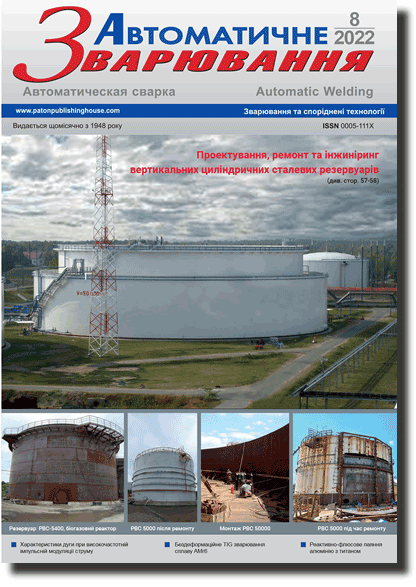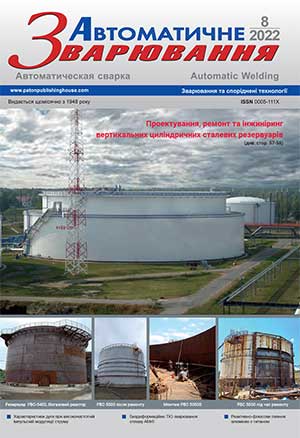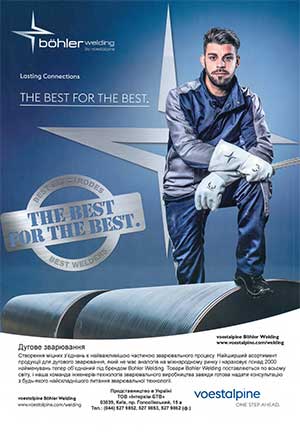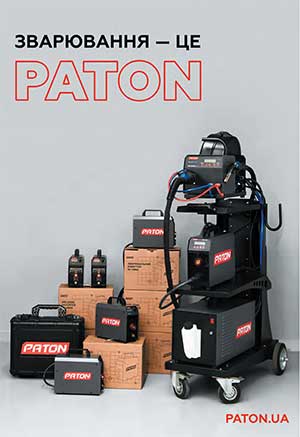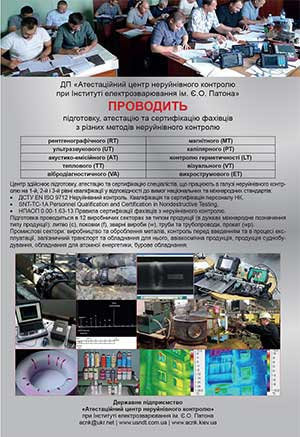| 2022 №08 (02) |
DOI of Article 10.37434/as2022.08.03 |
2022 №08 (04) |
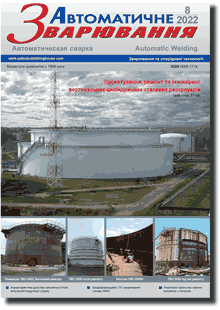
"Avtomatychne Zvaryuvannya" (Automatic Welding), #8, 2022, pp. 20-28
Peculiarities of welding joints of 15KH2M2FBS (P3) AND X10CrMoVNb91 (P91) STEELS
V.Yu. Skulskyi1, M.O. Nimko1, A.R. Gavryk1, I.G. Osypenko1, O.V. Vavilov2, O.G. Kantor2, L.P. Rubashka2
1E.O. Paton Electric Welding Institute of the NAS of Ukraine. 11 Kazymyr Malevych Str., 03150, Kyiv, Ukraine. E-mail: office@paton.kiev.ua
2JSC «Ukrenergymachines». 199 Heroyiv Kharkova Ave., 61037, Kharkiv. Е-mail: office@ukrenergymachines.com
Within the framework of currently urgent problem of reconstruction and restoration of equipment of thermal power units of TPP, work has been performed on development of basic technology of welding body elements of a steam turbine from low-alloyed 15Kh2M2FBS (P3) steel to branchpipes from high-chromium martensitic X10CrMoVNb91 steel with 9 % Cr (P91). The paper gives the results of determination of the thermal mode of welding such combined joints to prevent delayed fracture. Proceeding from study of the influence of different modes of high-temperature tempering on impact toughness of weld metal and hardness of welded joint areas hardened during welding, heat treatment modes were selected, depending on electrode material type. It is shown that the resultant mechanical properties of welded joints correspond to the requirements specified during work performance. 12 Ref., 5 Tabl., 9 Fig.
Keywords: heat-resistant steels, low-alloy steel, high-chromium martensitic steel, combined welded joints, cold cracks, hightemperature tempering, mechanical properties
Received: 05.02.2022
References
1. (2016) Coal thermal power engineering: Ways of reconstruction and development. In: Proc. of Int. Sci.-Pract. Conf. Kyiv.2. Teslenko, O.I., Gorskyi, V.V., Maliarenko, O.Ye. (2020) Analysis of tendencies and directions of development thermal power engineering. The problems of general energy, 1(60), 38-46 [in Ukrainian]. https://doi.org/10.15407/pge2020.01.038
3. Liratzis, T., Forno, M., Piombino, C. et al. (2010) Acciai martensitici al 9Cr-1Mo-Nb-V: proprietà, soldabilità e controlli. Riv. Ital. Saldatura, 2, Marzo/Aprile, 161-168.
4. Ahmet Shibli (2014) Coal Power Plant Materials and life Assessement. Developments and Applications. Woodhead Publisbing.
5. Kozlov, R.A. (1986) Welding of heat-resistant steels. Leningrad, Mashinostroenie [in Russian].
6. Sawhill, J.M., Dix, A.W., Sawage, W.F. (1974) Modifild implant test for studying delayed cracking. Weld. J., 35, 12, 554-560.
7. Hrivnak, I. (1984) Weldability of steels. Moscow, Mashinostroenie [in Russian].
8. Skulsky, V.Yu., Strizhius, G.H., Nimko, M.A. et al. (2019) Delayed fracture resistance of welded joints of rotor steel 25Kh2NVFA after welding reheating. The Paton Welding J., 2, 7-12. https://doi.org/10.15407/tpwj2019.02.01
9. Brózda, J. (2004) Stale żarowitrymałe nowei generacji, ich spawalność i własności złączny spawanych. Część IV. Stal E911. Biuletyn Instytutu Spawalnictwa, 4, 49-54.
10. (1993) Specification. Werkstoffblatt 435 R. Ausgabe März. Mannesmannröhren-Werke AG, Düsseldorf.
11. Skulsky, V.Yu., Tsaryuk, A.K., Gavrik, A.R. et al. (2016) Selection of modes of high-temperature tempering of heat-resistant steel welded joints made by electrodes Thermanit MTS616. The Paton Welding J., 9, 47-50. https://doi.org/10.15407/tpwj2016.09.10
12. Mokhila, P., Foldynova, K. (2014) Effect of postweld heat treatment on mechanical properties of R92 steel welded joints performed by submerged-arc welding. Metallovedenie i Termich. Obrab. Metallov, 4, 36-39 [in Russian].
Advertising in this issue:
The cost of subscription/purchase order journals or individual articles
| Journal/Currency | Annual Set | 1 issue printed |
1 issue |
one article |
| TPWJ/USD | 384 $ | 32 $ | 26 $ | 13 $ |
| TPWJ/EUR | 348 € | 29 € | 24 € | 12 € |
| TPWJ/UAH | 7200 UAH | 600 UAH | 600 UAH | 280 UAH |
| AS/UAH | 1800 UAH | 300 UAH | 300 UAH | 150 UAH |
| AS/USD | 192 $ | 32 $ | 26 $ | 13 $ |
| AS/EUR | 180 € | 30 € | 25 € | 12 € |
| SEM/UAH | 1200 UAH | 300 UAH | 300 UAH | 150 UAH |
| SEM/USD | 128 $ | 32 $ | 26 $ | 13 $ |
| SEM/EUR | 120 € | 30 € | 25 € | 12 € |
| TDNK/UAH | 1200 UAH | 300 UAH | 300 UAH | 150 UAH |
| TDNK/USD | 128 $ | 32 $ | 26 $ | 13 $ |
| TDNK/EUR | 120 € | 30 € | 25 € | 15 € |
AS = «Automatic Welding» - 6 issues per year;
TPWJ = «PATON WELDING JOURNAL» - 12 issues per year;
SEM = «Electrometallurgy Today» - 4 issues per year;
TDNK = «Technical Diagnostics and Non-Destructive Testing» - 4 issues per year.





